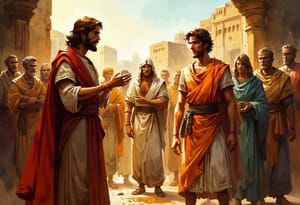| Series | The Gospel of Luke |
|---|---|
| Theme | 2. Receiving the word - Mauaina le upu |
| Colour | Lanu Auro |
Scripture Focus: Luka 7:18-35
The disciples of John told him about all these things. John, calling to himself two of his disciples, sent them to Jesus, saying, “Are you the one who is coming, or should we look for another?” When the men had come to him, they said, “John the Baptizer has sent us to you, saying, ‘Are you he who comes, or should we look for another?’” In that hour he cured many of diseases and plagues and evil spirits; and to many who were blind he gave sight. Jesus answered them, “Go and tell John the things which you have seen and heard: that the blind receive their sight, the lame walk, the lepers are cleansed, the deaf hear, the dead are raised up, and the poor have good news preached to them. Blessed is he who finds no occasion for stumbling in me.” When John’s messengers had departed, he began to tell the multitudes about John, “What did you go out into the wilderness to see? A reed shaken by the wind? But what did you go out to see? A man clothed in soft clothing? Behold, those who are gorgeously dressed, and live delicately, are in kings’ courts. But what did you go out to see? A prophet? Yes, I tell you, and much more than a prophet. This is he of whom it is written, ‘Behold, I send my messenger before your face, who will prepare your way before you.’ “For I tell you, among those who are born of women there is not a greater prophet than John the Baptizer, yet he who is least in the Kingdom of God is greater than he.” When all the people and the tax collectors heard this, they declared God to be just, having been baptized with John’s baptism. But the Pharisees and the lawyers rejected the counsel of God, not being baptized by him themselves. “To what then will I liken the people of this generation? What are they like? They are like children who sit in the marketplace, and call one to another, saying, ‘We piped to you, and you didn’t dance. We mourned, and you didn’t weep.’ For John the Baptizer came neither eating bread nor drinking wine, and you say, ‘He has a demon.’ The Son of Man has come eating and drinking, and you say, ‘Behold, a gluttonous man, and a drunkard; a friend of tax collectors and sinners!’ Wisdom is justified by all her children.”
- Luke 7:18-35 (WEB)
Study:
This passage reveals a pivotal moment of doubt for John the Baptist, even as Jesus’ ministry was exploding with miraculous signs. Imprisoned, John sent his disciples to Jesus asking, “Are you the one who is coming, or should we look for another?” This wasn't necessarily a lack of personal faith, but a crisis of expectation. John, anticipating a Messiah of power and judgment, may have struggled with the apparent humility and seemingly radical inclusivity of Jesus’ ministry.
Jesus doesn’t directly answer John’s question with a simple “yes” or “no.” Instead, He responds through His actions and instructs John’s disciples to report what they *see*: healing, liberation, and the proclamation of good news to the poor. Essentially, He says, “Look at what I’m doing—this is evidence of who I am.” This underscores a crucial truth: evidence of God’s presence and character isn’t always what we expect, and we must be open to recognizing Him in unexpected forms. Furthermore Luke highlights the different reactions of the people. Some recognized God’s justice in Jesus, while others, blinded by their own rigid expectations, rejected Him.
Application:
How often do we define what God *should* be doing in our lives, and then struggle when reality doesn't match our preconceived notions? This passage challenges us to examine our expectations and remain open to God working in ways that might be different from what we imagined. We must be careful not to let our preconceived ideas, or disappointment when things don't happen as we expect, cause us to doubt God's faithfulness or reject His work. Just as Jesus demonstrated His identity through His deeds, we can recognize God’s presence and purpose by looking at the evidence around us and staying open to the unfolding of His will.
Reflection Questions:
- Have you ever doubted God because your expectations weren’t met?
- How can you recognize God’s work even when it doesn’t align with your expectations?
- What “evidence” of God's presence have you observed in your own life?
- Are you willing to accept God's leading even when it feels unconventional?
Prayer:
Lord, forgive us for the times we have limited you to our own understanding. Open our eyes to see your work in all its fullness, and grant us the humility to accept your will, even when it differs from our own. Strengthen our faith and help us to trust in your unwavering love and purpose. Amen.
Tags:Luke, John the Baptist, faith, doubt, Messiah, Jesus, expectations, miracles, gospel, receiving the word, God's will
